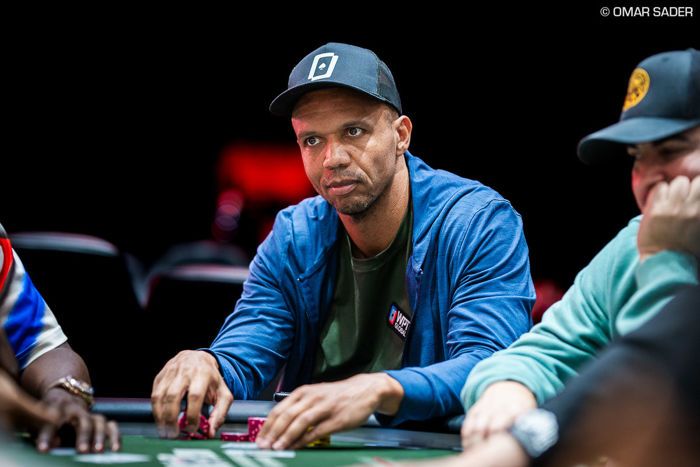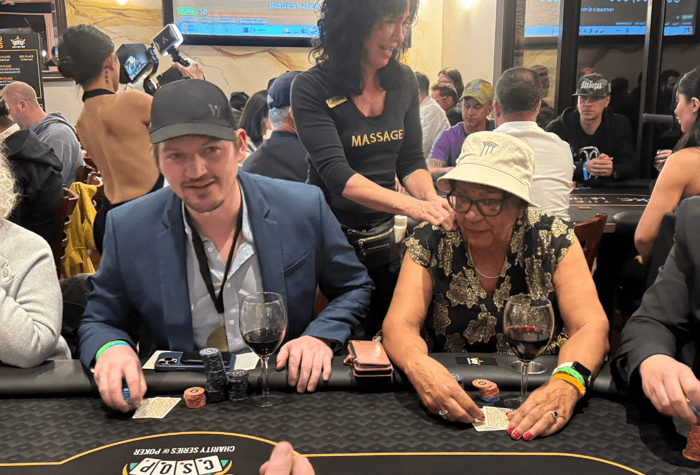lottery Result
Phil Ivey's Mom Revealsteen patti card master When She First Knew Her Son Was a Gifted Poker Player
Share on TwitterShare on Facebook Feb 19, 20253 min read Table Of ContentsRais teen patti card master
Share on Twitter Share on Facebook 3 min read
Table Of Contents
- Raising Poker Greatness
- Mom Plays Different Stakes
Long before Phil Ivey was regarded as one of the greatest poker players of all time, his mom knew he was gifted. Pamela Ivey realized this 25 years ago when her son won a $500 buy-in event at the First Annual Jack Binion World Poker Open in Mississippi for $53,297 — more than her yearly salary working in insurance.
The April 2000 event was 23-year-old Ivey's second-ever Hendon Mobresult and featured a final table that included 1983 WSOP Main Event runner-up Rod Peate and eventual 2021 WSOP Player of the Year Josh Arieh. He won his first WSOP bracelet just a month later and soon after became the poker icon he's known as today.
"I didn't think it was a good idea for him to play poker," Pamela Ivey told PokerNewsin an interview, "but when he won fifty-something thousand dollars, and at the time I think I was making close to 50, and I'm like, wow, he did that in one game? And it takes me the whole year? I thought, maybe it's okay."
Phil Ivey & Family Headline CSOP Awards
Raising Poker Greatness

In his 2019 Masterclass, Phil revealed that he first learned poker from his grandfather, who cheated him in five-card Stud with hopes that young Ivey would lose interest in poker. But Pamela, who spoke to PokerNewsduring a Feb. 12 Charity Series of Poker (CSOP) event in Las Vegas, said her son got his poker talents from another family member.
We come from a driven family, basically."
"My dad didn't really play, but he knew how to play," she said. "My dad was a police commissioner, and he did a lot of (things). He owned his own business. He didn't play poker. He didn't gamble. My uncle was the gambler, my dad's brother."
"Probably it was, like, inherited (by) him. My uncle never told Phil about playing poker."

Phil's sister, Cheyanne, is successful in another realm. The University of Miami School of Law graduate operates the Las Vegas-based consulting firm Ivey Solutions, a new presenting sponsor of the CSOP.
Did the Ivey children get their competitive drive from Mom?
"Well, I am very driven and they just, I don't know. I don't know where they got it. We come from a driven family, basically. Whenever we want to do something, we just go at it 100%."
Mom Plays Different Stakes
Phil regularly plays high-stakes poker tournaments around the world that cost six or seven figures to enter. Just as regularly, Pamela plays in a women's group game in Las Vegas for a fraction of the cost.
"I'm very, very frugal. My kids call me cheap, but I'm just frugal."
"But it's only a $10 buy-in," Pamela said. "We're not high-stakes."
To put the stakes in perspective, Pamela would have to win 100,000 buy-ins to put up the $1 million her son used to fire two bullets into December 2024's WSOP Paradise Triton Million.
"I'm very, very frugal. My kids call me cheap, but I'm just frugal."
In last week's CSOP event, Pamela played alongside Joey Ingram, one of the few content creators who has interviewed the reclusive Ivey. But Pamela said poker fans shouldn't let her son's quiet and cold demeanor fool them.
"He's very good to his mother," she said.
So good to his mother that he gifted her a $1 million condo.

Categories
Latest News
- Top Daily Earn Money App 2024: Easy Ways to Make Cash! 25-04-14
- A player's strategy for the game can be greatly improved by being familiar with these formats. The foundation for success in Indian Rummy is the formation of sets and sequences. Prioritizing the creation of sequences over sets is a crucial piece of advice. Since sequences necessitate consecutive cards of the same suit, they are more difficult for opponents to break. For example, you can concentrate on finishing this sequence before trying to form sets if you have a 5♠, 6♠, and 7♠. Having a pure sequence, or a sequence devoid of a joker, is also essential when declaring your hand because it indicates a stronger position. 25-04-14
- A Complete Guide to Mastering Indian Rummy Indian Rummy is a well-liked card game that blends strategy, skill, and luck. The game can accommodate two to six players and is usually played with two decks of cards, including jokers. Utilizing the cards dealt to each player, the main goal is to create legitimate sets & sequences. 25-04-14
- A sequence is made up of three or more consecutive cards of the same suit, whereas a set is made up of three or four cards of the same rank but different suits. 13 cards are dealt to each player at the start of the game, & the remaining cards are arranged face down to create the stockpile. One card is turned face up to begin the discard pile. In order to improve their hands by creating valid combinations, players alternately draw cards from the discard or stockpile pile. When the player successfully melds all of their cards into sets and sequences that are valid and discards their last card, the game is over. The value of unmelded cards that are still in players' hands at the end of the game determines their score in Indian Rummy; jokers are worth zero points, numbered cards are worth their face value, and face cards are worth ten. For any player hoping to succeed in Indian Rummy, it is essential to comprehend these basic rules. 25-04-14
- Top Daily Earn Money App 2024: Easy Ways to Make Cash! 25-04-14
- With this information, players can reduce the possibility of helping opponents complete their hands while simultaneously making well-informed decisions about which cards to keep or discard themselves. In addition to skill, winning Indian Rummy tournaments calls for sophisticated strategies that distinguish winning players from the competition. Mastering card counting is one such strategy; many experienced players use it to keep track of which cards have been played and which are still in play. 25-04-14
- Players can avoid making snap decisions by carefully examining each move. Another important factor in keeping focus while playing is discipline. Establishing personal development objectives, such as becoming proficient in particular tactics or improving observational abilities, can keep players inspired and involved during games. 25-04-14
- Discarding cards that don't improve your hand is crucial, but it's also critical to think about what your opponents might require. Avoid discarding cards that could aid an opponent in finishing their sets or sequences if you observe that they have been regularly selecting cards from the discard pile. If your opponent is picking up 3♠ from the discard pile and you have two 4♠ and one 5♠, for instance, it might be wise to hold onto your 4♠ until you can tell if they are building towards a sequence. 25-04-14
- Daily Earn Money App: Free and Easy Way to Boost Your Income 25-04-14
- Monitoring high-value cards and knowing how they are distributed among players will help you make better choices regarding your own gameplay. Using psychological tricks while playing is another sophisticated tactic. This entails generating diversions or pretending to be uninterested in particular game elements while quietly monitoring the responses of opponents. For example, opponents might undervalue the potential of your hand if you seem indifferent to a certain suit while covertly keeping important cards from that suit. Also, it is essential for success to modify your approach according to the tournament format. Playing cautiously may be a good idea until you assess the strengths and weaknesses of other players in knockout tournaments where elimination is on the line. 25-04-14
Contact Us
Contact: cu
Phone: 020-123456789
Tel: 020-123456789
Add: 联系地址联系地址联系地址
